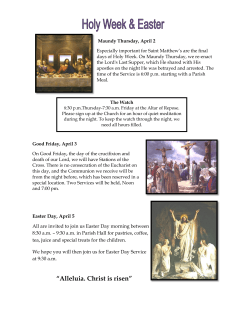
Pew Handout - Holy Family Parish
Et erit Jonas in ventre ceti Consurgens, apprehendit ambas tribus diebus & trib. noc. Mt. 12 portæ fores cum postibus. Jud.16 The Paschal Vigil of the Resurrection of Our Lord Jesus Christ MUSIC PROGRAM The holiest night of the year begins with the blessing of the new Easter fire, the lighting of the Paschal candle, and the solemn Paschal proclamation, the Exsultet, in which the Resurrection of the Lord is declared. It is the Feast of Feasts, the Holiest of Holies, a night of sacred joy and anticipation in which we await the hour of Resurrection. By the holy light of Easter fire, we meditate on salvation history and the love of God for His people through all of time, listening to lessons and canticles from the Old Testament. Please refer to a hand missal, or the Sacred Triduum booklets in the vestibule of the church, for the full texts. Finally, the entire heavenly court is invoked with the Litany of the Saints, as we prepare, by the solemn blessing of Easter water, to receive new Christians into the Church through the regeneration of Baptism. The holy water is brought to the font, where the Sacrament is to take place. Sicut cervus / Sitivit anima mea Giovanni Pierluigi da Palestrina (c.1525–1594) Psalm 41:2–4; please refer to a Missal to to the Sacred Triduum booklet for the text. If there are catechumens to be baptized into the Church at this time, or candidates to be confirmed, those Sacraments are administered now. Otherwise, the faithful proceed to solemnly renew the promises they made at their baptism: to renounce the devil and his works, and to commit to living a life of faith in God and in His holy Church. The Litanies are resumed as the sacred ministers prepare for the Mass of the Resurrection. The most sacred hour is upon us, when the glorious light of Christ rising from the dead shall dispel all the darkness of death, and all our mourning shall be changed to joy. When all is ready, the cantors solemnly intone the Kyrie, which begins the Mass. THE MASS OF THE RESURRECTION Kyrie VI ad libitum (Te Christe Rex supplices) Gloria, from Mass I (Lux et origo) — Tempore paschali Offertory Motet: Surrexit Christus hodie Erhard Bodenschatz (1576–1636) Easter carol, Bohemia, 14th c. Surrexit Christus hodie, alleluia! Humano pro solamine, alleluia! In hoc paschali gaudio, alleluia! BENEDICAMUS DOMINO, alleluia! Mortem qui passus pridie, alleluia! Miserrimo pro homine, alleluia! Laudetur Sancta Trinitas, alleluia! DEO dicamus GRATIAS, alleluia! Christ is risen today, alleluia! For the comfort of the human race, alleluia! In this Easter joy, alleluia! Let us bless the Lord, alleluia! The death that He suffered yesterday, alleluia! Was for the sake of man most wretched, alleluia! Praised be the Holy Trinity, alleluia! Let us say, Thanks be to God, alleluia! 2nd Offertory Motet: Regina cæli Lodovico Grossi da Viadana (c.1560–1627) Marian Antiphon for Paschaltide Regina cæli, lætare, alleluia! Quia quem meruisti portare, alleluia! Resurrexit, sicut dixit, alleluia! Ora pro nobis Deum, alleluia! O Queen of Heaven, rejoice, alleluia! For He Whom thou didst merit to bear, alleluia! Hath risen as He said, alleluia! O pray to God for us, alleluia! Sanctus, from Mass I (Lux et origo) — Tempore paschali Communion Motet: Dum transisset Sabbatum John Taverner (c.1490–1545) cf. 2nd Responsory of Matins for Easter Sunday (pre-1955); Mark 16:1–2 Dum transisset Sabbatum, Maria Magdalene, et Maria Jacobi, et Salome emerunt aromata: † ut venientes ungerent Jesum. * Alleluia, alleluia. Et valde mane una Sabbatorum, veniunt ad monumentum, orto jam sole. † Ut venientes ungerent Jesum. * Alleluia, alleluia. Gloria Patri, et Filio, et Spiritui Sancto. * Alleluia, alleluia. When the Sabbath was over, Mary Magdalene, Mary the mother of James, and Salome had bought sweet spices, that they might come and anoint Jesus. Alleluia, alleluia. And very early in the morning on the first day of the week, they came unto the sepulchre at the rising of the sun, that they might come and anoing Jesus. Alleluia, alleluia. Glory be to the Father, and to the Son, and to the Holy Ghost. Alleluia, alleluia. For Lauds of Easter Sunday, please refer to a Missal or to the Triduum booklet. Recessional Hymn: THE STRIFE IS O’ER Text: Finita jam sunt prœlia, 12th c. Latin carol; transl. by Francis Pott, 1861, alt. Tune: VICTORY, based on Magnificat IIIi toni¸ Palestrina, 1561; ad. by W. H. Monk, 1861 Alleluia, alleluia, alleluia! 1. The strife is o’er, the battle done! Now is the Victor’s triumph won; O, let the song of praise be sung: Alleluia! 2. The pow’rs of death have done their worst, But Christ their legions hath dispersed; Let shouts of holy joy outburst: Alleluia! 3. On the third morn He rose again, Glorious in majesty to reign; O let us swell the joyful strain: Alleluia! 4. He closed the yawning gates of hell; The bars from heav’n’s high portals fell; Let hymns of praise His triumph tell: Alleluia! 5. Lord, by the stripes which wounded Thee, From death’s dread sting Thy servants free, That we may live, and sing to Thee: Alleluia! Choral Postlude: Christus resurgens a5 Peter Philips (1561–1628) Ancient responsory for Easter Sunday; cf. Romans 6:9–10; 4:25 Christus resurgens ex mortuis jam non moritur, mors illi ultra non dominabitur. Quod enim mortuus est peccato, mortuus est semel: quod autem vivit, vivit Deo. Mortuus est semel propter delicta nostra, et resurrexit propter justificationem nostram. Quod autem vivit Deo. Alleluia, alleluia. Christ, rising from the dead, now dieth no more; death shall no longer have dominion over Him. For inasmuch as He died to sin, He died but once; but in that He now liveth, He liveth unto God. Truly He died for our offenses; but He hath risen from the dead for our justification. And insofar as He now liveth, He liveth unto God. Alleluia, alleluia. -
© Copyright 2025









